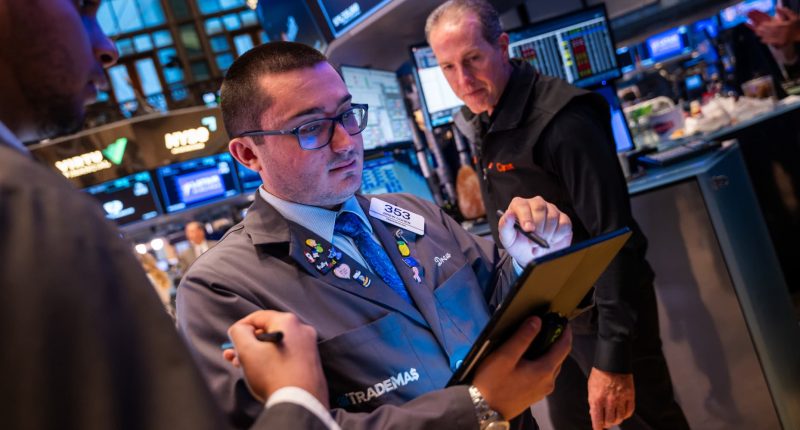As Election Day approaches, Wall Street is preparing for an anticipated surge in trading activity, expecting volatile market conditions driven by political uncertainty. Banks, brokerages, and other financial institutions are ramping up staffing to handle the potential challenges in the market as results from the U.S. presidential election roll in.
Wall Street Ramps Up Staffing as Election Nears, Expecting Volatile Trading
The Anticipated Impact of Political Uncertainty on Markets
As Election Day approaches, the political landscape is set to cause significant market movements. With Democratic Vice President Kamala Harris and Republican former President Donald Trump neck-and-neck in the polls, the uncertainty surrounding the election outcome has financial institutions bracing for increased market volatility.
Why Political Events Trigger Market Volatility
Political events, especially elections, often lead to rapid market shifts. Traders and investors may need to quickly adjust their strategies, which can cause liquidity and market risks to spike. These risks can put immense pressure on trading systems, making it crucial for financial firms to be prepared.
Preparing for Uncertainty: Wall Street’s Staffing Strategy
Given the potential for market fluctuations, financial institutions are taking proactive steps to ensure they can manage the expected trading volumes. Banks, brokerages, and exchanges are enhancing their workforce, adjusting vacation schedules, and conducting system checks to ensure they can handle the election-related demand.
Northern Trust’s Plan for Election Week
“We are preparing for at least a week of uncertainty following the election, ensuring we have sufficient coverage to manage higher volumes and volatility,” said Grant Johnsey, regional head of client solutions for Capital Markets at Northern Trust.
Past Events Driving Current Caution
Financial institutions have learned from past political events, such as the 2016 Brexit vote and Trump’s victory over Hillary Clinton. These events led to unexpected market fluctuations, pushing firms to adapt quickly. This historical perspective has made Wall Street even more cautious about the upcoming election, prompting further preparation.
Volatility Index Shows Smaller Election Bump
According to BofA data, the Cboe Volatility Index (VIX), which measures market expectations for volatility, typically rises by around 25% during election years. However, the “election bump” has been smaller this year, reflecting some uncertainty about how the markets will respond to the Harris-Trump faceoff.
Strengthening Systems to Handle Increased Trading Volume
In addition to bolstering staffing, many firms are reviewing their systems to ensure they can cope with any potential spikes in trading volume. From system testing to round-the-clock staff coverage, Wall Street firms are doing everything they can to minimize disruption.
Cboe Global Markets’ System Resilience
Chris Isaacson, Chief Operating Officer at Cboe Global Markets, highlighted that their systems are designed to handle at least double the volume of their previous peaks. This resilience is key to ensuring that trading can continue smoothly, even in periods of extreme volatility.
Investor Concerns Over a Contested Election
Another factor adding to Wall Street’s caution is the possibility of a contested election. Trump’s previous efforts to challenge the results of the 2020 election have heightened concerns that this election could also result in prolonged uncertainty.
The Potential Impact of a Contested Election
A contested election could cause prolonged market instability, with investors left uncertain about the political future. This heightened risk is why firms are not just preparing for election night, but for an extended period of potential market turbulence.
The Role of Technology and Automated Trading Systems
Many financial firms rely on automated trading systems, which power after-hours trading and provide liquidity to the market. These systems must be prepared for an uptick in activity, as investors respond to election updates.
Blue Ocean Technologies Prepares for the Election
Brian Hyndman, CEO of Blue Ocean Technologies, whose system powers overnight trading for multiple brokerages, emphasized the need for extra staff during this period. Hyndman stated, “We’ll have more hands on deck than in a typical overnight session to address any technical issues and ensure smooth trading.”
Final Thoughts on Wall Street’s Election Preparations
With an election outcome that could swing in either direction and a contested result as a real possibility, Wall Street is leaving no stone unturned. From adding staff and testing systems to adjusting schedules and preparing for extended uncertainty, the financial sector is bracing for potential volatility in the markets.
Long-Term Market Implications
Regardless of the election outcome, the policy differences between Harris and Trump could lead to significant shifts in markets, foreign relations, and the global economy. For traders and investors, the election is more than just a political event—it’s a crucial moment that could have lasting market implications.
Conclusion
As Election Day draws near, Wall Street is preparing for heightened volatility and trading volumes. Financial institutions are ramping up staffing, conducting system checks, and bracing for potential uncertainty. With a contested election a possibility and significant market movements expected, Wall Street is ensuring it’s ready to navigate whatever challenges arise.









